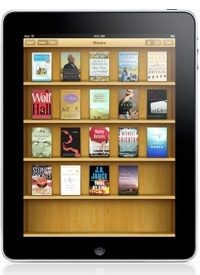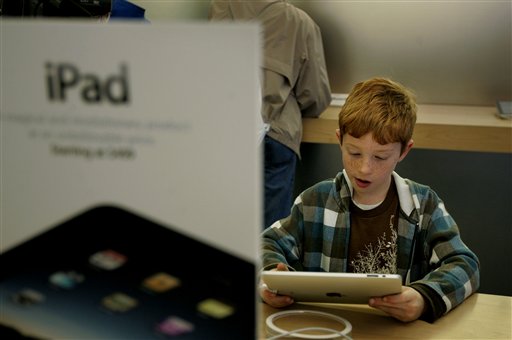
Earlier this week, USA Today asked the question: “Can college students learn as well on iPads, e-books?” The iPad and its biggest rivals, Amazon’s Kindle and the Nook by bookseller Barnes & Noble, are being tested in schools and universities across the country and the measure of their success is still sketchy. That is to say, despite their flash, power, and popularity, these newest technological tools are still on academic probation.
The article in USA Today cites a few examples of less than cum laude integration of the iPad, Kindle, et al., into the scholastic habits of students. “Princeton and George Washington universities this spring found the iPad caused network problems,” the paper states. It seems that even the early adopters in academia are struggling to switch from more traditional means of study and research.

There are other limitations that concern faculty and staff, however. Ryan Lawson, the director of technology at Brother Rice High School in Bloomfield Hills, Michigan, purchased 700 iPads is considering the purchase of 700 iPads, one for every student at the all-boys Catholic school.see note While the boys were understandably excited by the new technology’s place in the curriculum, Mr. Lawson fears that the lack of remote monitoring makes the iPad vulnerable to misuse by young people and thus more of a burden than a blessing in the quest for academic excellence.
Without the ability to remotely monitor student activity, teachers are unlikely to rely on the iPad for bolstering lectures and other classroom centered presentations. To a man, teachers at Brother Rice told Lawson that the lack of a remote monitoring control panel was a deal breaker with regard to the consistent use of iPads in the classroom.
Another significant impediment to the iPad’s fomenting Apple’s dominance in the academic market is the frustrating lack of e-book versions of popular textbooks. High schools spend millions on textbooks and that budget isn’t reduced by using the iPad, as many publishers have yet to create compatible electronic copies of their product. According to one high school administrator quoted in a recent Business Week article on the topic, to achieve an acceptable return on investment (ROI), half of the textbooks used in any school would have to be available in e-book format before the iPad or other such readers will make good economic sense for schools that already pinch pennies just to provide the basics to their students.
Regardless of these issues, Oklahoma State University announced earlier in the year that this fall students in the School of Media and Strategic Communications and the Spears School of Business would receive iPads as part of the required material for those disciplines. Students will use the devices as personal study tools, as well as to research ways they may be more effectively implemented in the workforce.
“This limited pilot will be focused on the fields of study where we believe we can best determine the higher education value of the iPad,” explained Bill Handy of the School of Strategic Communications. He told the online tech blog Macsimum News that the program would aim to measure the academic value, as well as the long-term vocational value of the iPad and the panoply of applications (called apps) that run on the device. The theory is that if the students successfully dovetail the iPad into the day-to-day demands of their academic careers, than they are more likely to carry the versatile device with them as they enter their careers in the wider world.
OSU isn’t alone in its effort to adapt the iPad to its curriculum. At the Illinois Institute of Technology, all incoming freshman will be provided an iPad pre-loaded with all the texts and software required for first year classes. “We can ensure everyone has the same hardware an software, and it makes it easier to integrate into the curriculum,” Evan Venie the associate director of media relations at IIT told wired.com. He believes that by putting an iPad in the hands of all new students, the faculty will be encouraged to create coursework that takes advantage of the unique capabilities of the iPad.
Notwithstanding the fervor and the furor accompanying attempts to integrate this remarkable technology into the classrooms and laboratories of the country’s academies, there is the question of whether or not the empirical data support the move with regard to the improving of education. As with many such studies, the reports are mixed.
Numbers from one study reveal that on average, students who used computer-based instruction scored 14 points higher on achievement tests than those without computers. However, that same study reports that the benefits of using technology in the classroom are larger in elementary school and diminish somewhat as the student progresses into high school and college. An analysis of the study conducted by another researcher indicated that “the level of effectiveness of educational technology is influenced by the specific student population, the software design, the educator’s role, and the level of student access to the technology.”
For now, then, the ubiquity of the iPad in the world of academia is hampered by a lack of control, a lack of compatible titles, and a lack of funds necessary to provide iPads to enough students to legitimize its use. As with any novel teaching aid, there are glitches that need to be worked out. As the iPad comes down in price and textbook publishers begin producing e-book versions of their textbooks, then the iPad and other such devices will facilitate the communication of information that is the cornerstone of effective education.
Note:
We originally and incorrectly reported that Brother Rice High School had, in fact, purchased 700 iPads. In a telephone interview, Mr. Lawson explained that his school is considering the purchase and may acquire the devices, but the final decision on the matter may not come for another year.



